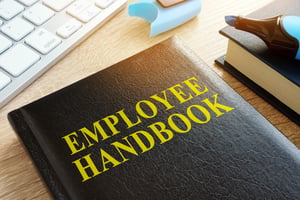Scura, Wigfield, Heyer, Stevens & Cammarota Blog
- Blog
The Importance of Employee Handbooks
 Irrespective of the size of your business, companies should have an employee handbook or manual. Employee handbooks can provide certainty and structure to your operations as well as place your employees on notice as to what you expect from them. Employee handbooks do not have to manage every aspect of your business. In fact, companies should avoid including within a handbook details regarding its operations that are subject to frequent change or policies and procedures the company will not enforce. At the same time, companies should not attempt to use form handbooks; one size does not always fit all.
Irrespective of the size of your business, companies should have an employee handbook or manual. Employee handbooks can provide certainty and structure to your operations as well as place your employees on notice as to what you expect from them. Employee handbooks do not have to manage every aspect of your business. In fact, companies should avoid including within a handbook details regarding its operations that are subject to frequent change or policies and procedures the company will not enforce. At the same time, companies should not attempt to use form handbooks; one size does not always fit all.
In preparing or updating an employee handbook, it is extremely important that employers preserve their right to terminate its employees at-will. New Jersey is an at-will employment state meaning that unless an employee has a separate written contract with the company, the company may terminate that employee with or without cause. Accordingly, it is imperative that an employee handbook contain an adequate disclaimer stating clearly that nothing in the handbook may be construed to create a contract of employment, either implicitly or explicitly. This disclaimer should be placed on the first page of the handbook and should be in clear and simple language. It is important that companies do not use legalese or attempt to hide the disclaimer in any manner. Courts considering whether the language of an employee handbook creates a contract of employment do not look favorably upon ambiguous or overly complicated disclaimers.
In addition to containing a clear disclaimer, companies should have a separate page for employees to sign providing that the employee has received and read the employee handbook and acknowledges that nothing contained therein is intended to create a contract of employment. Companies may also consider having the employee sign the receipt and acknowledgement form in the presence of a company officer or human resource manager. Once signed by the employee, such receipt and acknowledgment should be kept in the employee's personnel file so as to avoid any dispute by the employee in subsequent litigation.
To learn more about preparing and/or updating your employee handbook, feel free to contact me at cheyer@scuramealey.com or call me at 973-786-1582.
Share Article
Need Help? Contact Us Today!





Lists by Topic
- Bankruptcy (323)
- Personal Injury (95)
- Chapter 13 (52)
- Chapter 7 (51)
- Debt Management (50)
- Foreclosure (47)
- Accident (32)
- Car Accident (27)
- Chapter 11 (25)
- Business Bankruptcy (20)
- Insurance Claims (19)
- Credit (18)
- Business Law (13)
- Employment Law (12)
- Litigation (12)
- Probate and Estate Law (11)
- Damages (10)
- Medical (10)
- Product Liability (10)
- Workers Compensation (10)
- Attorney (9)
- Consumer Bankruptcy (9)
- Commercial & Residential Real Estate (6)
- Slip and Fall (6)
- Contracts (5)
- Premises Liability (5)
- Repossession (5)
- wrongful death (5)
- Video | Bankruptcy (4)
- Bankruptcy Cost (3)
- Corporate Litigation (3)
- Trial Law (2)
- student loans (2)
- tax (2)
- Attorney Fees (1)
- COVID-19 (1)
- Certified Civil Trial (1)
- Dog Bites (1)
- News (1)
- Relocation Assistance (1)


